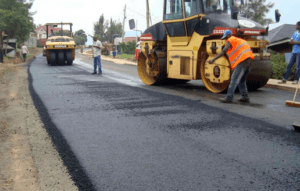Only 27% of roads in Ghana are paved – Minister
 Of the total road network of more than 780,000 kilometres under the portfolio of the Ministry of Roads and Highways, only 27 per cent are paved.
Of the total road network of more than 780,000 kilometres under the portfolio of the Ministry of Roads and Highways, only 27 per cent are paved.
The paved roads are made up of trunk, feeder and urban with 41 per cent of the total network in good condition.
Mr Kwesi Amoako-Attah, the Minister of Roads and Highways, said this at the second Ghana-Japan High Quality Infrastructure Conference in Accra on Tuesday.
He said the figure had stagnated over the past five years due to dwindling budget allocations, but assured that the government under its transformational agenda was undertaking a novel way to improve on the infrastructure.
“Public Private Partnership (PPP) and other innovative Private Financing arrangements have been viewed by Ghana as a strategic way to harness the skills and finances of the private sector to deliver and close the gap in all the infrastructural sectors especially for road projects,” he said.
“The Government therefore continues to explore and refine these arrangements as a solution to developing roads along economically vital transport corridors. The development of infrastructure will also create jobs through the private sector,” Mr Amoako-Attah said.
Ghana’s medium-term goal, he explained, was to ensure a resilient built environment while safeguarding the natural environment.
Mr Amoako-Attah stated that the Government was clearing the backlog of outstanding bills and procuring new projects across the country through competitive tender processes.
Aside the roads sector, he said the Government was pursuing an aggressive program of streamlining business processes at the ports and in the public sector in order to attract and retain investors.
“All these measures are intended to create a business-friendly environment that will assure all investors of the security of their investments,” he noted.
Mr Samuel Atta Akyea, Minister for Works and Housing, said infrastructure roll out was capital intensive hence the need for partnership to invigorate the economy.
“Whenever there is a suffering economy the means to jumpstart it is through infrastructural development,” he said.
He said the housing deficit of the country had climb beyond two million and that the government was exploring avenue including using the pool of pension funds to finance housing.
Mr Akyea stated that the drainage system of Dr Kwame Nkrumah was weak and could not sustain the sprawling city of Accra and the government was taking effective steps to fix it.
“It is important to note that those who disregard issues of water and sanitation pay in high currency through health of the people,” he said.
Mr Tsutomu Himeno, Japanese Ambassador to Ghana, said after the first edition of the conference held in 2017, the interest of Japanese companies had been high and urged government to continue to create the conducive environment to enable them operate.
Source: GNA
